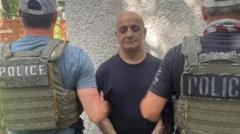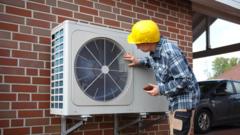Is This the End for the Israeli Town After a Deadly Strike?

Understanding the Impact of Escalating Tensions in the Middle East: A Closer Look at Beersheba
In recent weeks, the geopolitical landscape of the Middle East has seen a significant escalation of tensions, particularly between Israel and Iran. The harrowing events in Beersheba serve as a stark reminder of the human cost associated with these conflicts. As residents navigate their newfound reality after missile strikes, questions arise about the fragility of peace, the effectiveness of ceasefires, and the broader implications for regional stability. This article delves into the recent missile strikes in Beersheba, the experiences of those affected, and the ongoing conflict between Israel and Iran, aiming to provide a comprehensive understanding of the situation.
The Context of the Israel-Iran Conflict
The conflict between Israel and Iran is rooted in decades of political, ideological, and military disputes. Iran's support for militant groups such as Hezbollah and Hamas, along with its nuclear ambitions, has led to heightened tensions with Israel, which views Iran as a significant threat to its national security. The recent military actions are not isolated incidents but part of a long-standing rivalry that has seen various flare-ups over the years.
Historical Background
To fully grasp the current situation, it's essential to understand the historical context. The roots of the Israel-Iran conflict can be traced back to the Iranian Revolution in 1979, which saw the establishment of an Islamic Republic that opposes Israel's existence. Since then, Iran has funded and armed groups that engage in hostilities against Israel, leading to a cycle of violence and retaliation.
The Role of Regional Powers
Regional dynamics play a crucial role in the Israel-Iran conflict. Countries like Saudi Arabia and Turkey have their interests, often aligning with or against Israel and Iran based on the geopolitical landscape. This complexity makes the situation more volatile and unpredictable, as alliances shift and new players enter the fray.
Recent Events: The Beersheba Missile Strike
On a seemingly ordinary day in Beersheba, the tranquility was shattered by missile alarms. Residents were jolted awake, thrust into a life-or-death situation as they scurried to their safe rooms. The sound of sirens echoed through the streets, a haunting reminder of the ever-present threat they face.
The Immediate Aftermath
The missile strike that hit Beersheba caused widespread fear and destruction. Merav Manay, a local resident, described the moment the missile struck as terrifying. The impact left her family and neighbors in shock, highlighting the immediate human cost of the conflict.
- Destruction of Property: The missile blast shattered windows and caused significant structural damage to buildings.
- Loss of Life: Tragically, four individuals lost their lives in the strike, underscoring the severe consequences of such military actions.
- Community Response: Local volunteers and residents rallied to support one another, showcasing the resilience of the community amid despair.
The Role of Safe Rooms
In Israel, the construction of safe rooms in homes and buildings is a critical safety measure designed to protect families from missile attacks. These reinforced spaces, equipped with heavy metal doors, provide a sense of security in times of crisis. However, the psychological toll of such experiences cannot be understated, as families grapple with the trauma of living under constant threat.
The Psychological Impact on Residents
Surviving a missile strike is not just a physical ordeal; it leaves lasting psychological scars. Residents of Beersheba must now confront the emotional aftermath of the attack, which can manifest in various ways:
- Fear and Anxiety: The sound of sirens and alarms can trigger panic and anxiety, making everyday life challenging.
- Post-Traumatic Stress Disorder (PTSD): Many survivors may experience symptoms of PTSD, requiring mental health support.
- Community Bonding: In the face of adversity, many residents find strength in community solidarity, helping each other cope with their experiences.
The Fragility of Ceasefires
After the missile strike, both Israel and Iran announced a tentative ceasefire. However, the reliability of such agreements remains questionable, especially given the history of violations. The situation in Beersheba serves as a microcosm of the broader challenges facing ceasefire agreements in conflict zones.
Why Ceasefires Often Fail
Ceasefires are often fragile and can be undermined by various factors, including:
- Lack of Trust: Historical animosities create skepticism regarding the sincerity of ceasefire agreements.
- Continued Hostilities: Even minor skirmishes can escalate quickly, breaking the fragile peace.
- External Influences: Other regional players may influence the dynamics, either supporting or undermining the ceasefire.
The Role of International Mediators
International organizations and countries often attempt to mediate conflicts, seeking to establish lasting peace. The effectiveness of these mediators varies, and their involvement can sometimes lead to temporary solutions rather than long-term resolutions.
The Broader Implications for Regional Stability
The ongoing conflict between Israel and Iran has far-reaching implications for the Middle East. The geopolitical landscape is constantly shifting, and the consequences of military actions can ripple across borders, affecting neighboring countries and communities.
Impact on Neighboring Countries
As tensions escalate, neighboring countries must navigate their policies carefully. The following factors come into play:
- Refugee Crises: Escalating conflicts can lead to increased numbers of displaced persons, impacting regional stability.
- Economic Consequences: Ongoing violence can disrupt trade routes and economic relations between countries.
- Alliances and Rivalries: Shifts in alliances can lead to new rivalries, further complicating the geopolitical landscape.
The Role of Global Powers
Global powers have vested interests in the region and often influence outcomes through diplomatic or military means. Their involvement can either exacerbate the situation or contribute to resolution efforts, depending on the strategies they employ.
Looking Ahead: Hope for Peace or a Cycle of Violence?
The experiences of residents like Merav and Oren in Beersheba illustrate the harsh realities of living in a conflict zone. As they navigate the aftermath of the missile strike, they hold onto hope for a peaceful resolution, even as they grapple with fears of future violence.
Building Resilience in Communities
In the face of ongoing threats, communities must focus on resilience. This involves not only physical preparedness but also emotional and psychological support systems. Local organizations and mental health resources can play a vital role in helping residents cope with the trauma of conflict.
Conclusion: The Path Forward
The situation in Beersheba serves as a microcosm of the broader Israeli-Iranian conflict, highlighting the human cost of geopolitical tensions. As residents strive to rebuild their lives, the question remains: can a lasting peace be achieved in the region, or are conflicts destined to recur? The international community, regional powers, and local citizens must work together to address the underlying issues fueling the conflict and seek pathways to peace.
Frequently Asked Questions
What are the main causes of the Israel-Iran conflict?
The Israel-Iran conflict stems from historical animosities, ideological differences, and military tensions, including Iran's support for groups opposing Israel and its nuclear ambitions.
How does a missile strike affect civilian life in conflict zones?
Missile strikes cause immediate physical destruction and loss of life, but they also have lasting psychological effects, including fear, anxiety, and potential PTSD among survivors.
What measures can communities take to prepare for missile attacks?
Communities can implement safety measures such as building reinforced safe rooms, conducting emergency drills, and establishing clear communication channels to ensure residents are informed during crises.
As the situation in the Middle East continues to evolve, one must ponder: what steps can be taken to foster genuine dialogue and lasting peace between conflicting nations? #MiddleEastPeace #IsraelIranConflict #CrisisManagement
Published: 2025-06-24 17:38:20 | Category: technology



